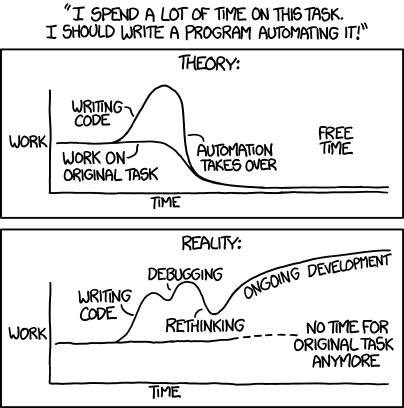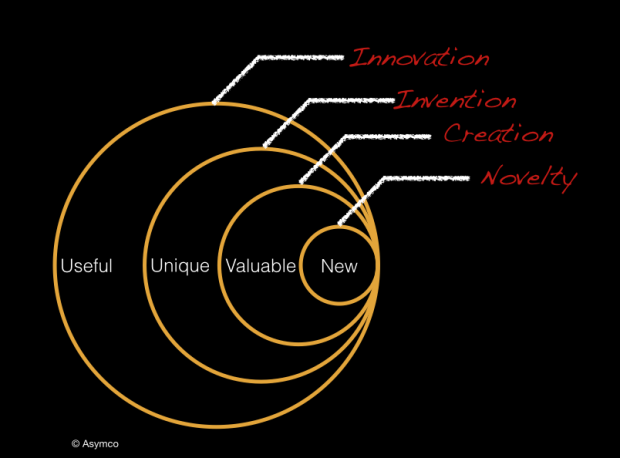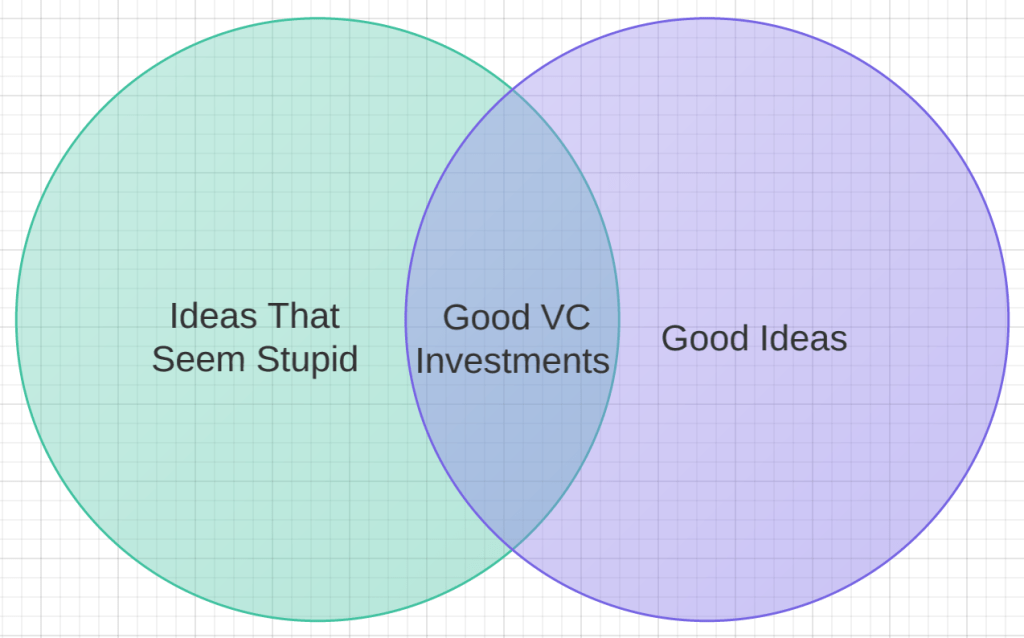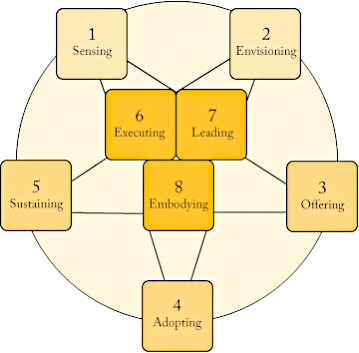Innovation is about finding a better way of doing something. Like many of the new development buzzwords (which many of them are over-used on many business documents), the concept of innovation originates from the world of business. It refers to the generation of new products through the process of creative entrepreneurship, putting it into production, and diffusing it more widely through increased sales. Innovation can be viewed as t he application of better solutions that meet new requirements, in-articulated needs, or existing market needs. This is accomplished through more effective products, processes, services, technologies, or ideas that are readily available to markets, governments and society. The term innovation can be defined as something original and, as a consequence, new, that “breaks into” the market or society.
Innoveracy: Misunderstanding Innovation article points out that there is a form of ignorance which seems to be universal: the inability to understand the concept and role of innovation. The way this is exhibited is in the misuse of the term and the inability to discern the difference between novelty, creation, invention and innovation. The result is a failure to understand the causes of success and failure in business and hence the conditions that lead to economic growth. The definition of innovation is easy to find but it seems to be hard to understand. Here is a simple taxonomy of related activities that put innovation in context:
- Novelty: Something new
- Creation: Something new and valuable
- Invention: Something new, having potential value through utility
- Innovation: Something new and uniquely useful
The taxonomy is illustrated with the following diagram.
The differences are also evident in the mechanisms that exist to protect the works: Novelties are usually not protectable, Creations are protected by copyright or trademark, Inventions can be protected for a limited time through patents (or kept secret) and Innovations can be protected through market competition but are not defensible through legal means.
Innovation is a lot of talked about nowdays as essential to businesses to do. Is innovation essential for development work? article tells that innovation has become central to the way development organisations go about their work. In November 2011, Bill Gates told the G20 that innovation was the key to development. Donors increasingly stress innovation as a key condition for funding, and many civil society organisations emphasise that innovation is central to the work they do.
Some innovation ideas are pretty simple, and some are much more complicated and even sound crazy when heard first. The is place for crazy sounding ideas: venture capitalists are gravely concerned that the tech startups they’re investing in just aren’t crazy enough:
Not all development problems require new solutions, sometimes you just need to use old things in a slightly new way. Development innovations may involve devising technology (such as a nanotech water treatment kit), creating a new approach (such as microfinance), finding a better way of delivering public services (such as one-stop egovernment service centres), identifying ways of working with communities (such as participation), or generating a management technique (such as organisation learning).
Theorists of innovation identify innovation itself as a brief moment of creativity, to be followed by the main routine work of producing and selling the innovation. When it comes to development, things are more complicated. Innovation needs to be viewed as tool, not master. Innovation is a process, not a one time event. Genuine innovation is valuable but rare.
There are many views on the innovation and innvation process. I try to collect together there some views I have found on-line. Hopefully they help you more than confuze. Managing complexity and reducing risk article has this drawing which I think pretty well describes innovation as done in product development:
8 essential practices of successful innovation from The Innovator’s Way shows essential practices in innovation process. Those practices are all integrated into a non-sequential, coherent whole and style in the person of the innovator.
In the IT work there is lots of work where a little thinking can be a source of innovation. Automating IT processes can be a huge time saver or it can fail depending on situation. XKCD comic strip Automation as illustrates this:

System integration is a critical element in project design article has an interesting project cost influence graphic. The recommendation is to involve a system integrator early in project design to help ensure high-quality projects that satisfy project requirements. Of course this article tries to market system integration services, but has also valid points to consider.
Core Contributor Loop (CTTDC) from Art Journal blog posting Blog Is The New Black tries to link inventing an idea to theory of entrepreneurship. It is essential to tune the engine by making improvements in product, marketing, code, design and operations.






5,158 Comments
Tomi Engdahl says:
https://futurism.com/the-byte/math-physics-savant-beat-roulette
Tomi Engdahl says:
Uusi laite antaa toivoa muistisairauksien hoitoon. Torontossa tehdyissä kokeissa aivopesurin avulla on pystytty palauttamaan hiiren muisti ensimmäisenä maailmassa.
“Ihmeitä näköjään tapahtuu”, sanoo professori, kun muistisairaiden aivoja pesevä laite sai puuttuvat rahat – nyt se voidaan hankkia Suomeen
https://yle.fi/a/74-20024183?utm_campaign=yleoppiminen&utm_source=facebook&utm_medium=social
Laitteesta odotetaan läpimurtoa muistisairauksien hoitoon. Fokusoitua ultraääntä käyttävällä laitteella voidaan lääkitä aivoja tehokkaammin ja pestä niistä pois kuona-aineita.
Oulun yliopisto on saanut Suomen Kulttuurirahastolta 700 000 euron apurahan fokusoitua ultraääntä käyttävän FUS-tutkimuslaitteen hankintaan. Laite mahdollistaa täsmähoitojen tutkimisen ja voi olla ratkaiseva askel parantavien hoitojen kehittämisessä esimerkiksi Alzheimerin tautiin, aivolymfoomaan ja epilepsiaan.
– Ihmeitä näköjään tapahtuu.
Torontossa tehdyissä kokeissa aivopesurin avulla on pystytty palauttamaan hiiren muisti ensimmäisenä maailmassa. Kiviniemen mukaan vie kuitenkin jonkin aikaa, ennen kuin hoitotutkimuksia ihmisillä voidaan alkaa Oulussa tehdä.
– Kullervo Hynysen ryhmä on osoittanut jo monessa artikkelissa, että aivoveriesteen hetkellinen avaaminen on täysin turvallista, Kiviniemi sanoo.
Oulussa aivoveriestettä on hetkellisesti avattu valtimon sisäisellä tekniikalla vuodesta 2007 asti.
– Saatamme jatkossa olla ainoa keskus maailmassa, jossa molemmat hoidot onnistuvat ihmisellä turvallisesti.
FUS-laitteen avulla aivoverieste voidaan hetkellisesti avata ja saada aivoihin perille lääkettä jopa satakertainen määrä. Samalla aivoista voidaan pestä pois sinne kertyneitä kuona-aineita, joilla on yhteys muistisairauksien syntyyn.
Aivopesurin saaminen potilaskäyttöön vie vielä vuosia
Professori Vesa Kiviniemi saa tasaisesti potilailta, omaisilta ja kollegoilta kysymyksiä siitä, milloin aivojen peseminen olisi käytännössä mahdollista.
– Tavallisten potilaiden kohdalla puhutaan vielä vuosista. Parin vuoden sisällä tiedämme paremmin, mitä koneella voi tehdä ja miten hoito kannattaa tehdä, hän sanoo.
Matka kohti kliinistä hoitoa etenee hitaasti. Torontossa aivojen pesemistä tutkiva Kullervo Hynysen tutkimusryhmä on Kiviniemen mukaan vuosia edellä Oulun tutkimustasoa. FUS-laitehankinta mahdollistaa todellisen kliinisen yhteistyön Hynysen kanssa.
Kiviniemi tuntee vastuunkin painavan: pian pitäisi saada jotain todella näkyvää aikaiseksi.
Tomi Engdahl says:
Delivering a quantum future
Innovations require engineering breakthroughs and focus on real computational problems.
https://www.technologyreview.com/2023/04/07/1069778/delivering-a-quantum-future/
Tomi Engdahl says:
Physicists Extend Qubit Lifespan in Pivotal Validation of Quantum Computing
https://www.sciencealert.com/physicists-extend-qubit-lifespan-in-pivotal-validation-of-quantum-computing
Tomi Engdahl says:
How to Tame the Endless Infinities Hiding in the Heart of Particle Physics
By
CHARLIE WOOD
April 6, 2023
In the math of particle physics, every calculation should result in infinity. Physicists get around this by just ignoring certain parts of the equations — an approach that provides approximate answers. But by using the techniques known as “resurgence,” researchers hope to end the infinities and end up with perfectly precise predictions.
https://www.quantamagazine.org/alien-calculus-could-save-particle-physics-from-infinities-20230406/
Tomi Engdahl says:
Graphene sensor could let you control robots with your mind
The Australian Army has already used the mind-control headset to command a robot dog.
https://www.freethink.com/hard-tech/bci-robot-dog
Tomi Engdahl says:
The Museum of Failure Celebrates Some of the World’s Biggest Flops
Now on view in New York City, the traveling exhibition presents failure as a critical learning opportunity
https://www.smithsonianmag.com/smart-news/the-museum-of-failure-celebrates-some-of-the-worlds-biggest-flops-180981896/
Tomi Engdahl says:
You’ve probably never heard of terahertz waves, but they could change your life
Welcome to the electromagnetic dark zone.
https://www.popsci.com/science/terahertz-waves-future-technologies/
The spectrum covers everything from radio waves and microwaves, to the light that reaches our eyes, to X-rays and gamma rays. And humans have mastered the art of sending and receiving almost all of them.
There is an exception, however. Between the beams of visible light and the blips of radio static, there lies a dead zone where our technology isn’t effective. It’s called the terahertz gap. For decades now, no one’s succeeded in building a consumer device that can transmit terahertz waves.
“There’s a laundry list of potential applications,” says Qing Hu, an electrical engineer at MIT.
But some researchers are slowly making progress. If they stick the landing, they might open up a whole new suite of technologies, like the successor to Wi-Fi or a smarter detection system for skin cancer.
The mystery of the terahertz
Look at the terahertz gap as a borderland. On the left side, there are microwaves and longer radio waves. On the right side lies the infrared spectrum. (Some scientists even call the terahertz gap “far infrared.”) Our eyes can’t see infrared, but as far as our technologies are concerned, it’s just like light.
Standard electronic components, like silicon chips, can’t go about their business quickly enough to make terahertz waves. Light-producing technologies like lasers, which are right at home in infrared, don’t work with terahertz waves either. Even worse, terahertz waves don’t last long in the Earth’s atmosphere: Water vapor in the air tends to absorb them after only a few dozen feet.
There are a few terahertz wavelengths that can squeeze through the water vapor. Astronomers have built telescopes that capture those bands, which are especially good for seeing interstellar dust. For best use, those telescopes need to be stationed in the planet’s highest and driest places, like Chile’s Atacama Desert, or outside the atmosphere altogether in space.
The rest of the terahertz gap is shrouded in mist. Researchers like Hu are trying to fix this, but it isn’t easy.
The future of terahertz technology
For now, the two realms trying to enter the terahertz dark zone from either end remain largely separate. Even so, they’re giving the science world new abilities in a broad range of disciplines.
Some of those abilities could speed up communication. Your Wi-Fi runs on microwaves: Terahertz, with higher frequencies than microwaves, could forge a better connection that’s orders of magnitude faster. Through a wire, it could also create a lightning-fast cross between USB and fiber optics.
Terahertz waves are also ideal for detecting substances. “Almost every molecule has a ‘fingerprint’ spectrum in the terahertz frequency range,” says Sherwin. That makes terahertz waves optimal for picking out chemicals like explosives and the molecules in medicines. Astronomers already use that ability to look at the chemical compositions of cosmic dust and celestial objects. Closer to Earth, Han envisions a terahertz “electronic nose” that could even discern odors in the air.
Those terahertz signatures also make the far infrared ideal for scanning people and objects. Terahertz waves can see through stuff that light can’t, such as clothes, with the bonus of avoiding potentially harmful ionizing radiation like X-rays. Security screeners have already shown interest in the tech.
Tomi Engdahl says:
https://www.wired.com/story/unbelievable-zombie-comeback-analog-computing/
Tomi Engdahl says:
https://antroblogi.fi/2023/04/tutkijan-itsereflektio-ja-tieteen-laatu/
Tomi Engdahl says:
https://phys.org/news/2023-04-recreating-double-slit-nature-space.html
Tomi Engdahl says:
https://www.sciencealert.com/plants-really-do-scream-out-loud-we-just-never-heard-it-until-now
Tomi Engdahl says:
RESEARCHERS SAY THEY MANAGED TO PULL QUANTUM ENERGY FROM A VACUUM
https://futurism.com/the-byte/researchers-quantum-energy-vacuum
A team of physicists claims to have pulled energy out of a vacuum, Quanta reports — a trick that required them to teleport it from a different location using quantum tech.
The work builds on previous research by Tohoku University theoretical physicist Masahiro Hotta, who back in 2008 claimed to have found a way to produce negative energy, a seemingly counterintuitive aspect of quantum theory, inside a quantum vacuum.
Tomi Engdahl says:
THE EARTH’S CORE IS WRAPPED IN THE FLOOR OF AN ANCIENT OCEAN, SCIENTISTS SAY
https://futurism.com/the-byte/earth-core-ancient-ocean
Tomi Engdahl says:
https://www.hackster.io/news/the-unfolding-of-a-new-era-in-robotics-ee679d588a2b
Tomi Engdahl says:
https://hackaday.com/2023/04/03/self-healing-concrete-what-ancient-roman-concrete-can-teach-us/
Tomi Engdahl says:
https://hackaday.com/2023/04/03/truly-flexible-circuits-are-a-bit-of-a-stretch/
Tomi Engdahl says:
Stephen Hawkingin kuuluisalle paradoksille esitettiin ratkaisu
Mustien aukkojen tuottama Hawkingin säteily saattaa sisältää luultua enemmän infomaatiota. Jos tulos osoittautuu oikeaksi, se ratkaisisi mustiin aukkoihin liittyvän paradoksin.
https://www.avaruus.fi/uutiset/kosmologia-ja-teoreettinen-fysiikka/stephen-hawkingin-kuuluisalle-paradoksille-esitettiin-ratkaisu.html
Tomi Engdahl says:
https://futurism.com/the-byte/gamma-ray-burst-blinded-equipment
Tomi Engdahl says:
How Bill Gates’ Minesweeper addiction helped lead to the Xbox
Book excerpt: Convincing early ’90s Microsoft to sell games was an uphill battle.
https://arstechnica.com/gaming/2023/02/how-bill-gates-minesweeper-addiction-helped-lead-to-the-xbox/
Tomi Engdahl says:
Yhteinen patenttituomioistuin UPC aloittaa työnsä – mikä muuttuu?
30.03.2023
Takaisin
Eurooppalainen patenttijärjestelmä mullistuu 1.6.2023, kun yhtenäispatenttien (Unitary Patent eli UP) rekisteröiminen alkaa ja uusi yhteinen tuomioistuin aloittaa toimintansa. Uudistus muuttaa patentteihin liittyvää riidanratkaisua. Eurooppapatenttiasiamies Stefan Holmström kertoo, mitä patentinhaltijan ja patenttia hakevan kannattaa tietää.
https://www.kolster.fi/blog/upc-aloittaa-ty%C3%B6ns%C3%A4
Tomi Engdahl says:
Pöljäile, hassuttele, hulluttele, sekoile – Pidä hauskaa, koska se on tärkeämpää kuin mikään muu!
Pikku Kakkosessa kysyttiin: Onko hauska tärkeää?
https://hidastaelamaa.fi/2018/10/poljaile-hassuttele-hulluttele-sekoile-pida-hauskaa-koska-se-on-tarkeampaa-kuin-mikaan-muu/
Tomi Engdahl says:
Aivot tyhmentyvät, kun suutumme – lue, mitä ärsyyntyminen saa aikaan elimistössä
https://yle.fi/aihe/a/20-10001840
Tomi Engdahl says:
Absolute zero in the quantum computer: Formulation for the third law of thermodynamics
https://phys.org/news/2023-04-absolute-quantum-law-thermodynamics.html
Tomi Engdahl says:
Työryhmän loppuraportti
Vihreä siirtymä vaatii mittavaa rahoitusta – ja luo merkittäviä mahdollisuuksia suomalaisille yrityksille
https://valtioneuvosto.fi/-//10623/vihrea-siirtyma-vaatii-mittavaa-rahoitusta-ja-luo-merkittavia-mahdollisuuksia-suomalaisille-yrityksille
Tomi Engdahl says:
https://www.cnbc.com/2023/04/01/if-you-use-these-phrases-every-day-you-have-high-emotional-intelligence-say-psychology-experts.html
Tomi Engdahl says:
https://etn.fi/index.php/13-news/14843-kvanttikalvo-mahdollistaa-ultranopeat-tietokoneet
Tomi Engdahl says:
NASA Confirms That Cosmic Object Is so Bright That It Defies Laws of Physics
It’s definitely not an optical illusion.
https://futurism.com/nasa-confirms-object-so-bright-defies-physics
Tomi Engdahl says:
Magnets wipe memories from meteorites, erasing billion-year-old data
Researchers sound alarm over damage caused by popular meteorite-hunting technique
https://www.science.org/content/article/magnets-wipe-memories-meteorites-erasing-billion-year-old-data?utm_campaign=SciMag&utm_source=Facebook&utm_medium=ownedSocial
But when Gattacceca obtained a piece of Black Beauty and tried to decode its magnetic inscription, he found its memory had been wiped—Men in Black style—and replaced by a stronger signal. He instantly knew the culprit. Somewhere along its journey from Moroccan desert to street dealers to laboratory, the rock had been touched by strong hand magnets, a widely used technique for identifying meteorites. “It’s a pity that, just by using magnets, we’ve been destroying this scientific information that was stored there for 4 billion years,” Gattacceca says.
Tomi Engdahl says:
https://hackaday.com/2023/04/14/3d-printed-artificial-nose-is-totally-vegan/
Tomi Engdahl says:
Noninvasive Sensors For Brain–Machine Interfaces Based On Micropatterned Epitaxial Graphene
https://hackaday.com/2023/04/15/noninvasive-sensors-for-brain-machine-interfaces-based-on-micropatterned-epitaxial-graphene/
Tomi Engdahl says:
https://hackaday.com/2023/04/16/detecting-anti-neutrinos-from-distant-fission-reactors-using-pure-water-at-sno/
Tomi Engdahl says:
Uranium-241 Isotope Created And Examined Via Multinucleon Transfer Reactions And Mass Spectrometry
https://hackaday.com/2023/04/15/uranium-241-isotope-created-and-examined-via-multinucleon-transfer-reactions-and-mass-spectrometry/
Tomi Engdahl says:
Neuromorphic Camera Sees the Future
https://www.hackster.io/news/neuromorphic-camera-sees-the-future-11be98616dee
This camera captures the past and present in one frame, which makes future trajectory predictions much more compute and energy efficient.
A group of researchers at Aalto University have developed a new, much more efficient dynamic machine vision system that was inspired by the human visual system. The key innovation is a neuromorphic image sensor that not only senses the present, but also has a memory of the past. Both past and present are represented in the same image frame, so relatively simple and efficient machine learning algorithms can analyze the data to make future trajectory predictions.
A neuromorphic visual sensor can recognize moving objects and predict their path
The new smart sensor uses embedded information to detect motion in a single video frame
https://www.eurekalert.org/news-releases/986314
Tomi Engdahl says:
https://hackaday.com/2023/04/20/mri-resolution-progresses-from-millimeters-to-microns/
Tomi Engdahl says:
1,000% Difference: Major Storage Capacity in Water-Based Batteries Found
https://scitechdaily.com/1000-difference-major-storage-capacity-in-water-based-batteries-found/
Tomi Engdahl says:
Why atoms are the Universe’s greatest miracle
With a massive, charged nucleus orbited by tiny electrons, atoms are such simple objects. Miraculously, they make up everything we know.
https://bigthink.com/starts-with-a-bang/atoms-greatest-miracle/
Tomi Engdahl says:
Lithium Battery Ripe for Disruption, Inventor Says Nobel laureate calls for radical changes in manufacturing, mining, and recycling
https://spectrum.ieee.org/lithium-ion-battery-disruption-ready
Tomi Engdahl says:
Entangled Photons Produced Entirely On-Chip Quantum photonic technology reduced to the size of a coin
https://spectrum.ieee.org/quantum-entanglement
Tomi Engdahl says:
Physicists discover first transformable nanoscale electronic devices
https://phys.org/news/2023-04-physicists-nanoscale-electronic-devices.html
Tomi Engdahl says:
1700-luvun Suomessa eli ennustaja, joka väitetysti näki ennalta puhelimen, auton ja jopa Woltin tapaiset kuljetuspalvelut
Karvialainen Carl Harlund oli omalaatuinen kansanfilosofi, joka muistetaan paikkakunnalla edelleen.
https://yle.fi/a/74-20019118
Tomi Engdahl says:
https://hackaday.com/2023/04/19/water-solves-mazes-why-not-electrons/
Tomi Engdahl says:
The Sounds Emitted By Plants Are Real But They Are Still Not Talking
https://hackaday.com/2023/04/07/the-sounds-emitted-by-plants-are-real-but-they-are-still-not-talking/
A recent paper published by researchers at the university of Tel Aviv in Cell on the sounds they captured from ‘stressed’ plants had parts of the internet abuzz with what this meant, with some suggesting that this was an early April Fools prank. The fun part here is the news item is not that plants make noise, but rather that this was the first time (apparently) that the noise made by plants was captured by microphones placed at some distance from a variety of plants.
Sounds emitted by plants under stress are airborne and informative
https://www.cell.com/cell/fulltext/S0092-8674(23)00262-3
Tomi Engdahl says:
https://hackaday.com/2023/04/24/warmer-ice-cream/
Tomi Engdahl says:
https://www.iflscience.com/first-fully-complete-human-genome-is-now-available-to-all-68614
Tomi Engdahl says:
New zinc metal batteries can be cheap, efficient, durable, safe and environmentally friendly
https://techxplore.com/news/2023-04-zinc-metal-batteries-cheap-efficient.html
Tomi Engdahl says:
FIRST BABIES BORN AFTER BEING CONCEIVED BY ROBOT
IT’S A BRAVE NEW WORLD.
https://futurism.com/neoscope/babies-born-robot-ivf-conception
A Spanish startup has built a sperm-injecting robot that can be controlled using a PlayStation controller. The team successfully used it to fertilize human eggs, eventually resulting in the birth of two healthy babies.
As MIT Technology Review reports, one of the engineers working on the world’s first insemination robot didn’t have all that much experience in the field of fertility medicine — which was where the PlayStation 5 controller came into, well, play.
The first babies conceived with a sperm-injecting robot have been born
Meet the startups trying to engineer a desktop fertility machine.
https://www.technologyreview.com/2023/04/25/1071933/first-babies-conceived-sperm-injecting-robot-ivf-automation-icsi-overture/
Tomi Engdahl says:
https://futurism.com/the-byte/earth-core-ancient-ocean
Tomi Engdahl says:
https://www.newscientist.com/article/2369508-we-finally-know-why-insects-are-attracted-to-lights/
Tomi Engdahl says:
https://phys.org/news/2023-04-long-distance-quantum-teleportation-enabled-multiplexed.html